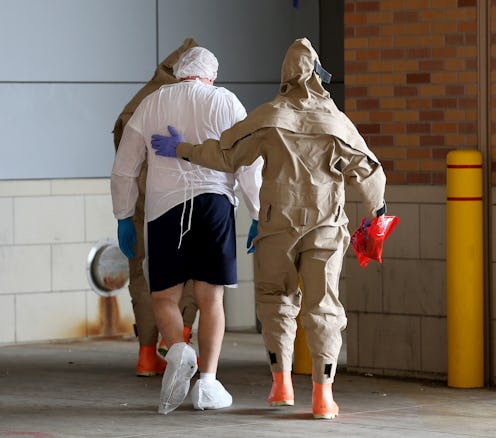News
A Second Healthcare Worker In Texas Has Ebola
Texas health officials announced Wednesday morning that a second health-care worker at Texas Health Presbyterian Hospital has tested positive for Ebola. The unidentified patient, now isolated at the hospital, had also cared for Thomas Eric Duncan, the first Ebola victim in Dallas.
According to the Texas Department of State Health Services, the worker reported a fever on Tuesday and was immediately put in isolation in the same hospital where Duncan was treated. A state public laboratory in Austin found positive results for Ebola, but a second test is being run by Centers for Disease Control and Prevention in Atlanta.
It is unclear if the new Ebola patient had contact with anyone while exhibiting symptoms, which is the only time the virus can be passed from person to person. Health-care officials say that they have interviewed the patient and plan to monitor any people who may have been exposed.
While at least 76 workers were exposed to Duncan before his death on October 8, only two have tested positive for the virus. On Sunday, Nina Pham became the first person to contract Ebola on U.S. soil. On Tuesday afternoon the hospital reported that Pham, a 26-year-old nurse, was in good condition.
The New York Times reported that Pham was described as a careful and conscientious nurse and seemed genuinely shocked that she was infected with the virus. Pham's positive results forced Dr. Thomas Frieden, director of the CDC, to take a good hard look at his agency's response to the virus. He has since apologized for comments he made essentially blaming Pham when he said that she breached protocol, but still hasn't offered an explanation on what exactly happened.
Frieden did admit, however, that the agency should and could have done more in response to Duncan's initial diagnosis. In a press conference Tuesday, just hours before a second worker would test positive for Ebola, Frieden said that the CDC could have stepped-up its management at the Texas hospital.
We did send some expertise in infection control. But I think we could, in retrospect, with 20/20 hindsight, have sent a more robust hospital infection control team and been more hands-on with the hospital from day one about exactly how this should be managed.
Frieden said Tuesday that the CDC would send a team of trained workers "within hours" to any hospital with a confirmed Ebola case, but is that enough? With a second worker being treated for a virus that Frieden seemed confident about containing, it is clear that something needs to change.
